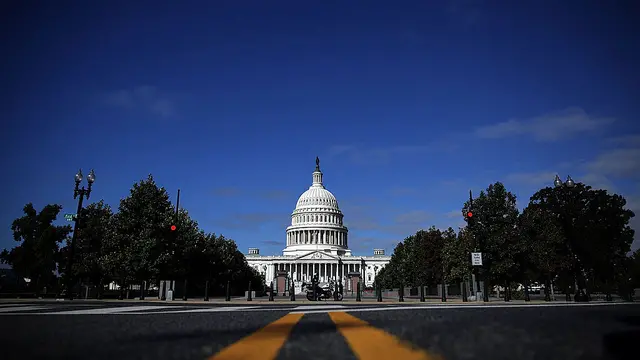***Editor's note: *Thomas O. Falk is a London-based political analyst and commentator. He holds a Master of Arts in international relations from the University of Birmingham and specializes in U.S. affairs. The article reflects the author's opinions and not necessarily the views of CGTN.
At first glance, one could assume that, albeit shaken by the Donald Trump presidency, America's democracy prevailed against all the attacks it endured in recent memory. After all, Trump was replaced by Joe Biden, and the U.S. survived an attempted coup in broad daylight on January 6.
However, besides these physical attacks, an erosion of the U.S.'s democratic framework has been taking place for several months. So much so that one must wonder whether the status quo of this American system still lives up to its own lofty standards. And what kind of a democracy is America if one of the two parties in a two-party system undermines democratic norms?
America's democracy is characterized above all by the fact that its people are free to choose their representatives, senators and presidents, regardless of factors such as skin color or income. However, electoral law reforms in many Republican-ruled U.S. states are increasingly undermining these fundamental civil rights, especially for African-Americans – yet again.
According to the Brennan Center for Justice, as of May 14, Republicans introduced a total of 389 bills – more than seven times as many as in 2020 – in 48 of 50 states that aim to make voting more difficult. In 14 of these states, 22 bills have become legislation.
Officially, these laws are being passed to make future elections safer. Behind this, however, is that in the Republican Party, it is currently part of the litmus test to continuously question the 2020 presidential election. Various Republicans, including Donald Trump, still ponder the "big lie" – the idea that the election was stolen.
As preposterous this idea remains, particularly since Trump's own Department of Justice at the time and the courts emphasized that no result changing irregularities ever occurred, the "big lie" continues to find its supporters in America. According to polls from the Associated Press–NORC Center for Public Affairs Research, 66 percent of Republican voters hence believe that Joe Biden is an illegitimate president.
The reforms are hence not about making the elections safer but about preventing further defeats for the Republicans.
The price tag for this political spiel is paid for by the American democracy since the primary aim of the election reforms is to minimize the ability of blacks and other minorities to influence the outcome of elections.
Changes such as the abolition of postal voting, the prohibition of automatically having sent voting documents, the closing of polling stations in areas where the majority of the population are poor, black or Latino, require certain IDs that members of minorities often do not possess, or ban on the distribution of drinking water in long queues in front of polling stations. Everything aims against minorities and their proclivity to vote.
Voters cast their ballots at a polling station at Masonic Lodge in Los Angeles, California, U.S., June 5, 2018. /Getty
In addition, gerrymandering, i.e., determining the electoral districts in such a way that they favor their candidates and exclude minorities, which has always been practiced – often so undemocratic that the Supreme Court intervened several times, is still common practice in the U.S.
The Republican modus operandi is reminiscent of darker times. In the 19th and 20th centuries, Jim Crow laws prevented African Americans from participating in America's democracy – despite the 15th Amendment passed in 1870 that was supposed to cease racial discrimination in the voting booth.
However, it took another 95 years until the Voting Rights Act of 1965 outlawed the still ever-present discriminatory voting practices, including literacy tests as a prerequisite to voting. President Woodrow Wilson once said that democracy is not so much a form of government as a set of principles.
It is precisely these principles that are increasingly being lost in the U.S., and it seems to be an irreversible course. With white Americans not being a majority anymore by 2050, Republicans will continue on the path they have now chosen to determine their political future. Even more division, increased racial tensions, and utter lack of cooperation between the two parties will be the result.
However, for a nation that considers itself the beacon of democracy, to the extent that it has repeatedly attempted to export its system of liberal democracy in the past, the current development leads the United States and its democracy as one knows it into an uncertain future.
Trump's departure has not cured the fundamental issues the United States' democracy faces. Instead, it appears to have exacerbated them. Unfortunately, the 2022 Midterm Elections, a significant test for America's system for various reasons, are likely to become a testament to the latter.
(CGTN)
 简体中文
简体中文



